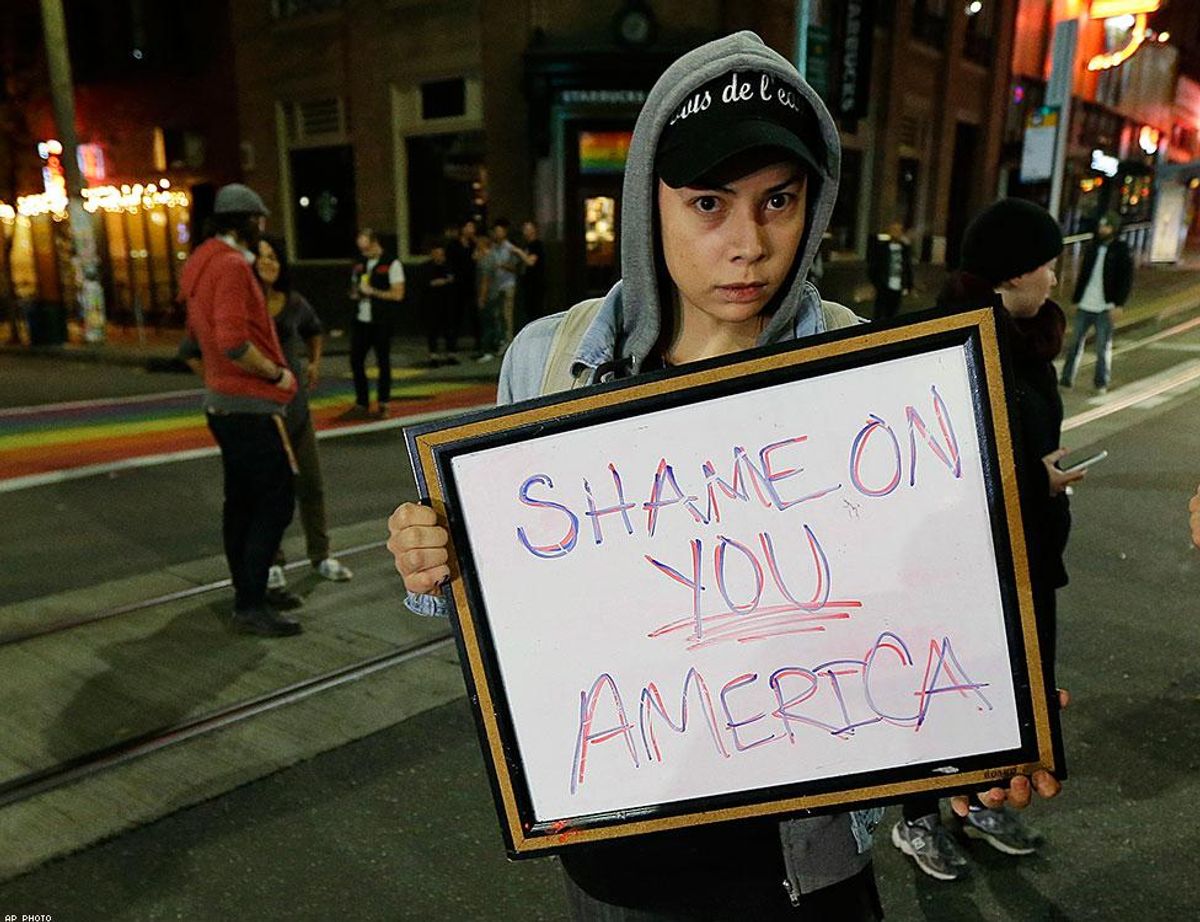Reality television star Donald Trump's shocking upset win during last Tuesday's election sent shockwaves through the LGBTQ community. The most acutely impacted group, however, was transgender people--terrified about what a Trump presidency could mean for their rights and lives.
In the days following the election, organizations and support groups that primarily serve the mental health needs of the trans community reported that an impending Trump presidency was having an immediate impact on clients, who began seeking out service providers in unprecedented numbers even though two-calendar months separated the president-elect from the Oval Office.
Reports from a private support group for parents of transgender youth, including screenshots, showed that a number of trans youth had committed suicide within the first 24 hours of the election. These reports went viral, although the claims have yet to be substantiated due to the group's desire to remain anonymous. Meanwhile, the call volume at Trans LifeLine, a crisis hotline for transgender people that was founded in 2014, was four times its normal rate just hours after Trump won the electoral college.
For LGBTQ people, the 2016 race wasn't just about their preferred candidate not getting elected. It was about harm reduction. With Trump now the president-elect, the focus for many is on surviving the next four years.
According to Greta Martela, the co-founder and executive director of Trans LifeLine, the group's call center usually receives around 100 calls at any given time. Following the election, that rate of call-ins skyrocketed to 400--with an estimated 60 percent of callers wanting to talk about the results of the election. Many of them are terrified about what this could mean for their everyday safety and don't know where to turn.
"We're on the second day of it," said Martela last week. "It started yesterday at 10pm. In the last hour, we've answered 20 calls. It hasn't slowed down at all. It's just started."
She said that the high volume of calls is likely to continue as long as Trump is president.
"I think [Trump's win] is something that's causing people to lose hope," Martela said. "With Barack Obama in office, things weren't great for trans people. But now we've got Donald Trump and Mike Pence who are above board anti-LGBT."
Pence, who served as the governor of Indiana before he became Trump's running mate, publicly supported reparative therapy during his campaign for Congress in 2000.
In addition, transgender people remain disproportionately likely to be unemployed. Whereas the unemployment rate for all Americans hovers around seven percent, that rate is twice as high for trans people: 14 percent. Martela said that if these were issues during the Obama administration, they're unlikely to improve under President Trump.
"I don't see a lot of hope for that over the next four years of this administration," she said. "I'm trying to help people maintain hope, but it's going to be a tough, uphill fight."
What makes the mental health of the community so vulnerable during this pivotal moment is that LGBTQ people are already at a higher risk of suicide and self-harm than the general population.
Research from The Williams Institute and the American Foundation for Suicide Prevention shows that 41 percent of trans people attempt suicide at some point in their lives. Meanwhile, studies show that LGBTQ youth are four times more likely than their peers to try to end their lives. Individuals are most likely to do so in environments where they have few legal protections, including states that lack non-discrimination laws or social support systems. 41 percent of homeless youth reportedly identify as LGBTQ.
Scott Ammarell, the CEO of Chicago House, told Out that the election proved a "triggering event" for LGBTQ people who may already have a history of trauma, especially following a campaign where minority groups were frequently targeted by social conservatives.
"When people get stressed about something, the chances increase that they will become less adherent to the behaviors that help them thrive," Ammarell explained. "They may be stressed and start engaging in harmful behavior. They may miss medical appointments, not take prescriptions, or start using substances again. It's usually some kind of a stressor that causes this kind of harm."
In October, the American Psychological Association put out a warning indicating that the 2016 race had caused a "significant amount of stress" for a majority of Americans. 52 percent claimed to have experienced anxiety as a result of the divisive national conversation.
"This has been an event that is likely to put some of our clients at risk, so we are working with our clients to ensure this doesn't cause them additional harm," Ammarell said.
What made the election so impactful is that it was so unexpected. Most people in the LGBTQ community believed that Hillary Clinton would win, especially considering that an overwhelming majority of polls showed her leading throughout the race. On election day, she was favored by three points. The fact that Clinton actually won the popular vote--by more than a million ballots, at the time of writing--isn't helping people cope.
Related | After the Election, Hillary Wanted to 'Curl Up' and 'Never Leave the House Again' -- #SAME
"I didn't really prepare myself emotionally for what it would mean to try and support so many people," genderqueer writer, activist, and OUT100 honoree Jacob Tobia explained. "I didn't prepare for what it would mean to have your whole community in an acute mental health crisis all at the same time, and I don't think our movement really prepared for that either."
"We were just like, 'Oh, well, this can't happen,'" Tobia added. "It's a doomsday scenario.'"
While this framing may seem dramatic, for many it's merely a reflection of recent history. Although trans people have made unprecedented gains in media representation, with the success of acclaimed television shows like Orange Is the New Black, Transparent, and The Fosters, the conservative backlash has moved with equal force in the opposite direction. In 2016, over 200 anti-LGBT laws were introduced to state legislatures, the Human Rights Campaign reports.
Many of those laws failed, but others, including North Carolina's House Bill 2, did not. HB 2, which was pushed through the General Assembly in a single day, effectively forced trans people to use public restrooms that do not correspond to their gender identity. Following Trump's election, the Texas legislature introduced a bill just like it.
The election is simply insult to injury for those who have experienced enough heartache this past year.
"We've already been dragged through so much during this national bathroom debate on top of the marginalization that we already were facing," Tobia said. "To add this on top as a victory for the folks who have been berating us, sanctioning violence against our bodies, and treating us as suspect over the past year and a half, it's really tough."
Following the election, Ammarell claimed that it's important that people don't lose hope. Since the election, Chicago House, which offers housing for low-income families and HIV-positive individuals, has fielded calls from "dozens" of people concerned about losing those life-saving programs under a Trump presidency. Ammarell said that social service organizations are going to continue to give LGBT people the same resources they have for decades.
They aren't going anywhere, he stressed.
"We started back in 1985 when there wasn't funding for people with HIV/AIDS," Ammarell explained. "There wasn't housing. There weren't services. There weren't sympathetic people. We started from nothing and grew this organization into the amazing institution we have today, and we're going to do what we can not just to continue the services we provide, but to expand them."
While this moment in our history has become a disquieting, uncertain time for the LGBTQ community, Ammarell said that it's up to all of us in the community to provide the comfort and support that people so desperately need. We can all be a part of that effort by checking in with each other, connecting those who need help with the social services in place to aid them, and giving to organizations in need of funding.
Looking back to at the community's continued resilience in the face of struggle, it seems that LGBTQ people will do what we have always done: keep on surviving.
























































































